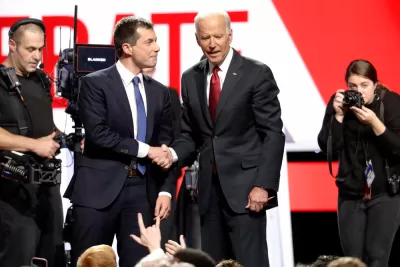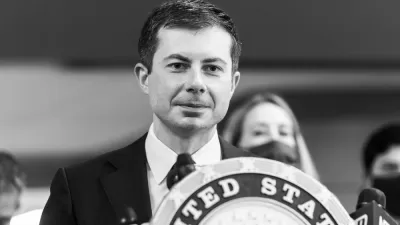You just got the top transportation job in the country. What are your priorities? Who are your allies? And one last question: Do you even want the job?

The impossibly improbable has occurred and you're the new transportation secretary.
Fifty-five thousand employees are waiting for their marching orders. Transportation “leaders” around the country – some rooting for your demise – watched your senate confirmation, all the flashy talk about reducing carbon, racial equality, and an economy that works for all. But talk is cheap, and they are ready to dissect and exploit your every move.
So what do you think about U.S. transportation?
You inherited your predecessor's office furniture and an $87 billion budget when Congress extended the FAST Act another year. But large chunks of the department's budget, including much of the nearly $47 billion allocated for roads and public transit are controlled by funding formulas set by Congress.
And that is precisely why your new boss hired you. He didn't pick a fly on the wall. Significant overhaul of the nation's infrastructure—which has become a perennial joke on Capitol Hill—will require significant negotiation with federal lawmakers.
But the shot clock is ticking. Democrats control the White House and both chambers of Congress, but pushing through your boss's $2 trillion infrastructure reform plan will be difficult if it doesn't happen this year, when midterm elections in 2022 could change your odds.
So who do you turn to?
You scratch your head, but it's obvious. You immediately dial-up Representative Peter A. DeFazio of Oregon, the top Democrat on the Transportation and Infrastructure Committee. He takes your call because he likes your boss. You have him over for dinner. The conversation and booze flow effortlessly.
Yet your next call and dinner party isn't as enjoyable. Senator Bill Hagerty, a Republican of Tennessee, was one of 13 senators to vote against you. He told everyone that you will "use the department for social, racial and environmental justice causes," instead of focusing on "streamlining environmental reviews for projects or other deregulation efforts."
So your hands are about to get dirty. Do you win Mr. Haggerty and his 12 amigos over by funding a rural highway-on-ramp in nowhere Tennessee, even though that will increase car use? Could be worth it.
Meanwhile, those other 'leaders" I mentioned won't stop pounding your door, reminding you that transportation is the biggest contributor to greenhouse gas emissions, and the Paris agreement your boss cares about is hopeless if you don't clean up U.S. transportation.
And others bust your chops by waving studies that conclude commuting time has emerged as the single strongest factor in the odds of escaping poverty and building a better life—a bigger factor than crime, test scores in schools, or living in a two-parent home.
Still, others call the climate crisis a hoax and accuse you and your leadership of being the real crisis.
But you have money you can use to make real changes immediately, including the department's $1 billion BUILD grant program that funds road, rail, transit, and port projects across the country. Your office controls the criteria that determine what project proposals are competitive for funding, and transportation secretaries from both parties have historically used this program to follow through on their priorities.
Speaking of which, what are your priorities?
Are you going to encourage bike lanes and bus travel?
Are you going to support sidewalks in distressed neighborhoods or cheaper transportation costs for low-income workers?
And one final question: Do you still want the job?
This article is inspired by Alan Guebert's February 7 column. Alan is an award-winning agriculture journalist, and if you don't already subscribe to the Farm and Food File or his tweets, you haven't lived. He makes reading about U.S. agriculture fun.

Maui's Vacation Rental Debate Turns Ugly
Verbal attacks, misinformation campaigns and fistfights plague a high-stakes debate to convert thousands of vacation rentals into long-term housing.

Planetizen Federal Action Tracker
A weekly monitor of how Trump’s orders and actions are impacting planners and planning in America.

Chicago’s Ghost Rails
Just beneath the surface of the modern city lie the remnants of its expansive early 20th-century streetcar system.

Bend, Oregon Zoning Reforms Prioritize Small-Scale Housing
The city altered its zoning code to allow multi-family housing and eliminated parking mandates citywide.

Amtrak Cutting Jobs, Funding to High-Speed Rail
The agency plans to cut 10 percent of its workforce and has confirmed it will not fund new high-speed rail projects.

LA Denies Basic Services to Unhoused Residents
The city has repeatedly failed to respond to requests for trash pickup at encampment sites, and eliminated a program that provided mobile showers and toilets.
Urban Design for Planners 1: Software Tools
This six-course series explores essential urban design concepts using open source software and equips planners with the tools they need to participate fully in the urban design process.
Planning for Universal Design
Learn the tools for implementing Universal Design in planning regulations.
planning NEXT
Appalachian Highlands Housing Partners
Mpact (founded as Rail~Volution)
City of Camden Redevelopment Agency
City of Astoria
City of Portland
City of Laramie



























